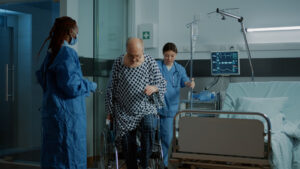You’ve just finished your Certified Nursing Assistant (CNA) training and have just gotten your state certification. After getting interviewed by a friendly recruiter and submitting your requirements, you’ve finally landed your very first CNA job. You’re excited and happy, but as your first day of work draws near, feelings of nervousness and anxiety start to creep in. Now that you’re going to put your CNA training into practice, you start to wonder if you’re truly ready to don your scrubs and help those in need. You realize that you need helpful tips on how to be a good CNA and you need them, stat!
New job jitters affect millions of employees, especially those who will start work for the first time. This is why it’s important to arm yourself with helpful knowledge that would help you quell your worries, boost your self-confidence, and help you become a successful CNA.
Don’t be shy — ask questions
Sometimes, new nurses will shy away from raising their hands and asking questions because they fear that it might make them appear to be ignorant or naïve in front of their coworkers. But this shouldn’t be how new nurses perceive asking questions. In reality, most experienced nurses and CNAs tend to be wary of novice CNAs who don’t ask questions. So, ask away!
If there are things that are unclear about your tasks, don’t be afraid to clarify them with more senior members of the healthcare team. If you need someone to demonstrate how a task should be done, don’t hesitate to inform experienced nurses and ask if you can observe how other nurses do it or if they’d be available to give you training until you get the hang of things. When it comes to patient comfort and safety, it’s better to be safe than sorry.
Ask for help (and be helpful, too)
There are tasks that you shouldn’t do alone, as it can lead to occupational injuries including back, spine, and knee injuries. Transferring patients and repositioning them is a two-person job, so remember to always ask for help from your fellow CNAs or orderlies before attempting to help patients.
It’s important to help your fellow CNAs too. Not only will this speed up work, especially when you’re buddying up, but it will help foster camaraderie and trust within your team.
Always protect yourself by wearing gloves and masks
You’ll be taking care of a variety of patients — some are ill and are undergoing treatment, while others have open wounds and bruises. Some patients would need help with activities of daily living, including showering, urinating, and defecating. For all these tasks and more, you’ll need to protect yourself by wearing gloves and masks.
For some tasks, such as helping clean up patients when they have their bowel movements, changing adult diapers, or cleaning up excretions, it’s a good idea to double or triple up the number of gloves you’re wearing. Doing so will help you save up on time as you can just simply remove the soiled gloves as you go. Remember to wash your hands before and after removing your gloves.
Always wear a mask whenever you’re with a patient. Even if your patients don’t have communicable illnesses, some patients have weak immune systems, and it’s safer for them if you wear masks around them. If you’re also not used to the different odors on the job yet, you can mask them by wearing double masks or dabbing a small amount of mentholated gel just underneath your nostrils.
Be prepared
You’re almost always going to be on your feet, and if you can bring most things that you’d need with you when you go visit patients, it will save you much time and effort (and leg and foot pain).
Bring your thermometer, stethoscope, pulse oximeter, disposal bags and linens, bandage scissors, and extra pairs of gloves with you. It’s also a good idea to bring a small notepad and pen (consider getting a retractable pen holder that you can attach to your ID badge) to write down important information or tasks you’d need to do for the day.







